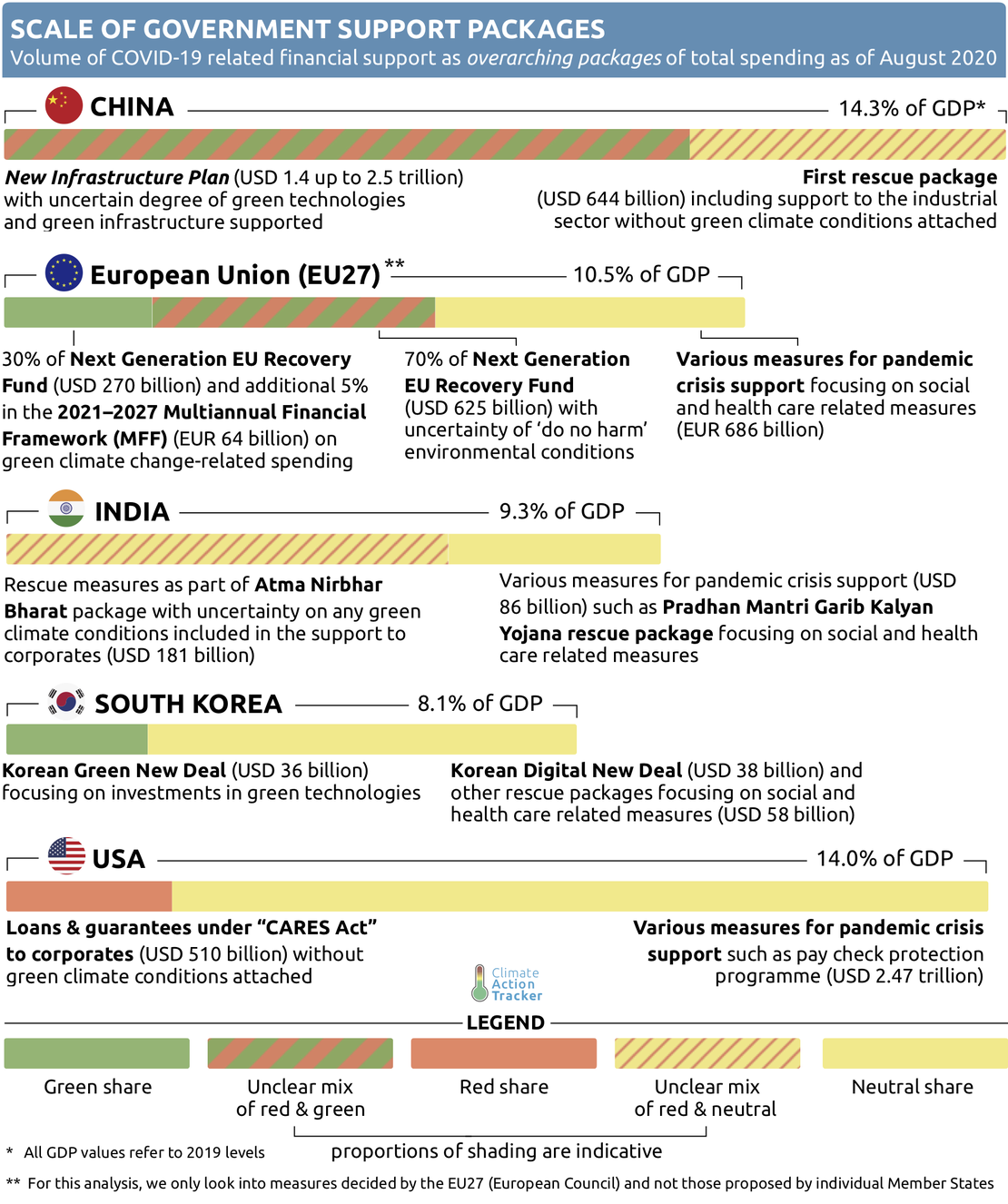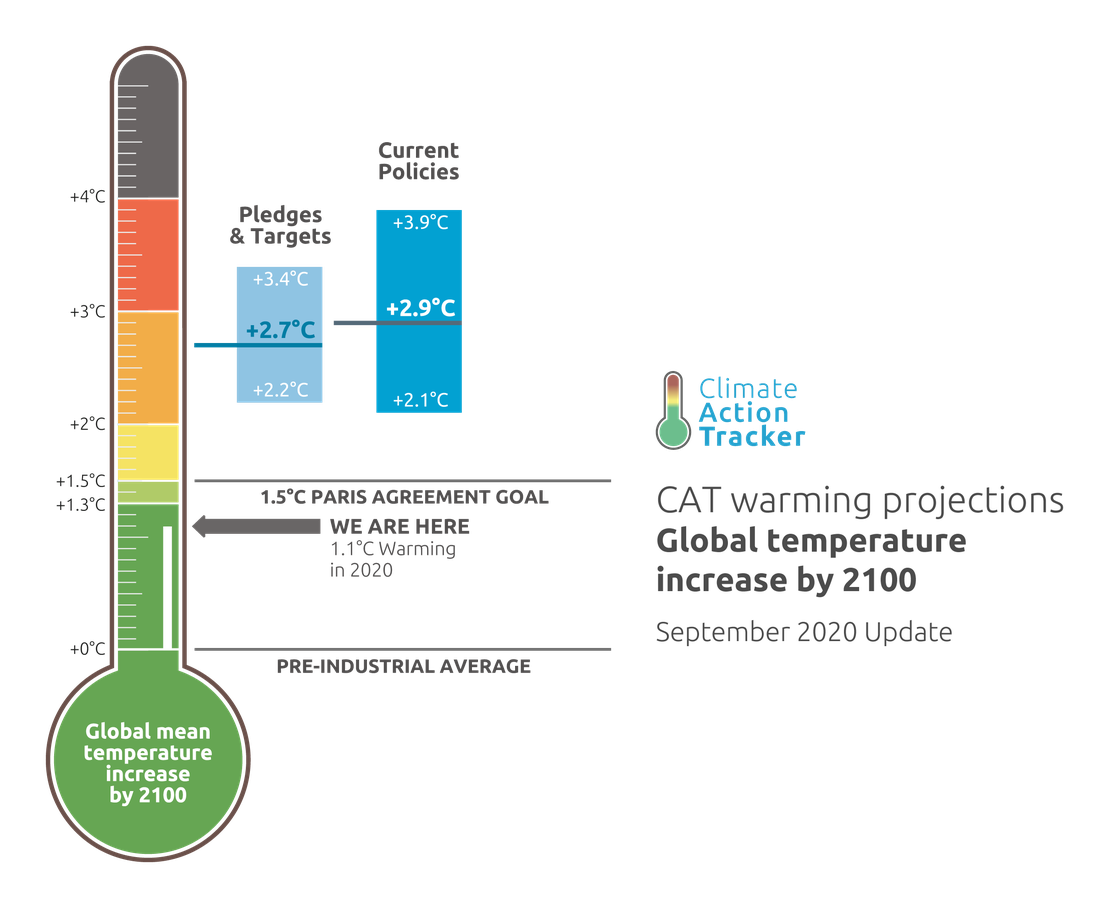Global update: Pandemic recovery with just a hint of green
Attachments
Global Pandemic Recovery Plans
In this briefing, we examine the COVID-19 recovery packages of five major emitters – China, EU27, India, South Korea and the USA; we present the global temperature update, taking into account the economic impact of COVID-19; and we share key insights from the updated assessments for 13 of the 36 countries assessed by the Climate Action Tracker, including projections of the effect of the COVID-19 pandemic on 2020 emissions.
This briefing provides a directional analysis as to what we could expect in terms of emissions developments in the future, considering that COVID-19 adds another layer of uncertainty to the forecasting exercise, given the lack of information and how long this will last.
COVID-19 recovery analysis: still waiting for green plans
For the analysis on recovery packages, we looked into 106 domestic measures across the five countries, grouped into overarching packages (aggregated rescue and recovery announcements) and individual interventions (relevant and quantifiable measures of rescue, recovery, and regulatory rollbacks).
At the overarching packages level, we found the investments being made represent more than 8% of GDP for the EU27, India and South Korea, and even up to 14% of GDP in the case of the USA and China.
There is even less information available at the individual interventions level. In fact, the interventions for which we were able to find detailed information account for only between 0.5% to 2.5% of GDP (compared to the 8% to 14% of GDP that the entire overarching packages represent).
Through this country-level analysis we find that key emitters are taking different approaches in their early economic recovery practices:

Economic impact has little long-term impact on temperature warming

Current global warming is now at 1.1°C above pre-industrial levels, and global average temperature will rise by 2.9°C, based on current policies (or policies governments are currently implementing) (WMO, 2020). This shows that governments are far from meeting the Paris temperature limit of 1.5°C.
While emissions are likely to be lower in 2030 compared to a pre-COVID-19 scenario, due to the economic downturn, this reduction in emissions is not the result of any structural change in the economy or decarbonisation efforts and therefore will not be sustained in the long run.
The effect of a lower current policies scenario in 2030 on our estimate of temperature increase by 2100 is minimal, because we assume that the dip in emissions will not continue post-2030. This temperature estimate is slightly lower compared to last year’s estimate for this reason and is more due to CAT methodological improvements rather than actual government action on climate (see technical annex for details).
The post-COVID-19 current policy scenario only considers the economic impact of the pandemic and does not yet consider the impact of any recovery or stimulus measures. To be compatible with the Paris Agreement’s temperature goal, governments must ensure that the recovery supports the transition to a zero emissions society.
Selected country highlights
Our latest updates of 13 countries show 2020 has seen little significant climate policy development. For details see our updated online country profiles or click on the country name to go directly to that profile.

Australia
Continuing with ineffective policies, investment in renewables drop and economic recovery focused on fossil fuels
The government has shown no intention of updating its Paris Agreement target, nor adopting a net zero emissions target. Renewable energy investments have dropped to 2017 levels due to lack of government policy direction with no new renewable energy target after 2020. The economic recovery is focusing on supporting the gas industry, with some support for coal as well.

Brazil
Accelerated environmental regulations rollbacks, growing deforestation and agriculture emissions
Brazil is heading the wrong direction having used the pandemic to further weaken environmental regulations. It seems unlikely that Bolsonaro’s administration will seize the opportunity for a green recovery. The continued roll-back of forest protection policies is enabling even higher rates of deforestation and the policy landscape in agriculture sector remains stagnant.

Canada
Time to deliver on climate action promises and focus on green recovery
Canada has promised to exceed its NDC and reach net zero emissions in 2050. However, the country continues to expand natural gas production and could expand coal exports, notwithstanding its membership in the Powering Past Coal Alliance. To date, the recovery plan has focused on helping fossil fuel interests pay for clean-up, with no financial support for the transition to zero emissions society.

China
Hints of a green recovery, but still a long way to go; ongoing support for coal at odds with global shift
China’s economic recovery has shown signs of improvement from its previous similar recovery packages, with hints of government’s commitment to accelerating renewables and electric vehicles. China’s commitment to coal remains concerning and at odds with the global decline in coal capacity. The recent phase-out of subsidies for renewables and EVs leads to uncertainty on the future of these sectors.

EU
Leading the way on climate policy, but still not Paris compatible, stronger NDC target being discussed
The EU27 has made climate mitigation one of the three main priorities of its economic recovery, the European Council agreed to spend at least 30% of the EU’s multiannual budget and recovery for climate action. It will revamp most of its climate legislation, including its 2030 target, and adopt new measures as part of its European Green Deal.

India
No new coal in 2020 but potential future growth still concerning
India has not built any new coal-fired power stations in 2020 but is still planning new coal. The government is encouraging more coal mining and production. India can accelerate the expansion of renewable energy and e-mobility, reduce emissions and capitalise on sustainable development benefits if it adopts a green economic recovery plan.

Indonesia
Huge coal electricity pipeline and bailouts for coal-heavy utilities
Indonesia one of a handful of countries to start a new coal plant construction in 2020 and has the fourth largest coal pipeline (30GW), globally. Its economic recovery plan also bailed out coal-heavy utilities, which contradicts the urgent need to phase out coal by 2040.

Japan
Climate policy may be shifting away from coal to renewables, a revised energy mix target by mid-2021 is likely
Japan recently announced plans to phase out inefficient coal-fired power plants and restrict overseas financing of coal power. Despite potential loopholes and limitations, these plans, together with another recently announced plan to boost offshore wind (10GW by 2030), may signal a shift in Japan's climate policy positions.

Mexico
Pandemic used as excuse to stifle renewables and promote fossil fuel; no strengthening of 2030 targets
Mexico has used the pandemic to pass several bills which effectively halt private investment in renewables and favours fossil fuel power generation. Even with the 2020 dip in emissions, Mexico needs to adopt ambitious policies to meet its NDC target, and use the NDC update process currently underway as an opportunity to strengthen its target.

Russian Federation
Continues to prioritise fossil fuels over renewables, on track to meet its weak target
Russia’s new 2035 energy strategy continues to promote fossil fuel expansion for both domestic and export markets. The recent economic recovery package is entirely devoid of climate-related measures. Russia’s proposed new 2030 target is still weaker than its own projection of current emissions.

Saudi Arabia
Oil exports declining, but very slow progress on diversification and renewables
Crude oil exports are down as global demand has shrunk. Contrary to the G20 commitment to phase out fossil fuel subsidies, the current G20 President announced further subsidies for its fossil fuel generated electricity in April 2020. While it has ambitious renewable energy targets, growth in installed capacity has been extremely slow.

South Africa
Shift to renewables at risk if opportunity to green the economic recovery is ignored
Prior to the pandemic, South Africa adopted its new electricity plan which would have contributed to the shift from coal to renewables. This plan could be undermined if carbon-intensive projects are prioritised as part of the economic recovery.

UK
Yet to walk green recovery talk or submit post-Brexit NDC, must scale up action to meet its 2050 net zero target
The government has yet to match its ‘build back greener’ rhetoric with strong action. The UK has strengthened policies since legislating its 2050 net zero target, but remains off-track to meet it. As upcoming COP26 President, the UK needs to lead by example and submit a 2030 NDC in line with its 2050 net zero goal.
Stay informed
Subscribe to our newsletter